| Bid Name | Description | Point Value of Bid |
|---|
| Simple Boston | A bid to play the hand using a declared suit of the bidding player's choice. When making this bid, the player must also declare a suit in which he will play the hand if his is the winning bid. If this becomes the winning bid this player is required to win 5 or more tricks to win the hand. When making this bid, a player simply states the number five followed by the special suit of the bid (i.e. "Five Spades"). In this and several of the other numbered bids, the high bidder may also request a temporary partner, which will be described further below. | 2 |
| Six Levees | The next highest bid category in Boston is a bid of Six Levees. This is a bid a player makes obligating himself to win six tricks during the hand, using a trump suit that is also declared during the bid. Thus, when making this bid a player also declares the trump suit to be used for the hand. | 4 |
| Little Misère | A bid to play the hand, winning zero tricks. No trump suit is declared or used during the hand. If this becomes the winning bid, before the first trick, each player selects any one card of choice from his own hand and discards it to the side not to be used during play of the hand. Thus, the hand consists of 12 tricks. | 4 |
| Seven Levees | A bid to win a minimum of seven tricks during the hand. This bid is made in conjunction with a suit declaration which is the suit which would be used for the hand if this bid is the high bid. | 8 |
| Picolissimo | A Bid to win exactly one trick during the hand. No trump suit is declared or used with this bid. If Picolissimo becomes the high bid for the hand, before the first trick each player discards one card of choice from his hand and discards it face down, where it will not be used during the hand. The hand will consist of 12 tricks. | 8 |
| Eight Levees | A bid to win at least eight tricks during the hand. The bid is made in conjunction with a suit declaration which is the suit which would be used for the hand if this becomes the high bid. | 8 |
| Grand Misère | A bid to win zero tricks during the hand. No trump suit is declared or used during the hand. Unlike the Little Misère bid, players do not discard any cards from their hand before play begins. | 8 |
| Nine Levees | A bid to win a minimum of nine tricks during the hand. This bid is made in conjunction with a suit declaration which is the suit which would be used for the hand if this bid is the high bid. | 8 |
| Little Misère on the Table | This is similar to a bid of Little Misère, with the high bidder attempting to win no tricks during the hand. As in the standard Little Misère bid, each player discards one card of his choice before the hand begins in the event this is the high bid. Before play begins, however, the high bidder must lay his entire hand face up on the table and play the hand with his hand exposed in this way. | 4 |
| Ten Levees | A bid to win at least ten tricks during the hand. This bid is made in conjunction with a suit declaration which is the suit which would be used for the hand if this bid is the high bid. | 8 |
| Grand Misère on the Table | A Bid to win no tricks during the hand. No trump suit is declared or used during the hand. No discarding occurs before the first trick, however the high bidder must place his entire hand face up on the table before the first trick and play the round with his entire hand exposed. | 8 |
| Eleven Levees | A bid to win eleven or more tricks during the hand. A selection of trump suits is also declared as part of the bid which will be the trump suit used during the hand if this becomes the high bid. Dissimilar to the previous Levee bids, the bidder of this bid may not call for a partner during this hand. | 16 |
| Twelve Levees | A bid to win twelve or more tricks during the hand. The bidder's choice of trump suits is also declared as part of the bid which will be the suit used as trump during the hand if this becomes the high bid. The bidder of this bid may not call for a partner for this hand. | 16 |
| Grand Boston | A bid to win all thirteen tricks during the hand. This bid also includes a declaration of the trump suit to be used for the hand as part of the bid. The winner of this bid may not call for a partner for this hand. This bid is also sometimes called Chelem. | 32 |
| Grand Boston on the Table | A bid to win all thirteen tricks during the hand with the added stipulation that the bidder must play the entire round with his hand face up on the table.. This bid would also includes a declaration of the trump suit to be used for the hand as part of the bid. The winner of this bid may not call for a partner for this hand. This bid is also sometimes called Chelem on the Table. | 32 |
| Bid Name | Description |
|---|
| Boston | Bid to play the hand and win at least five tricks during the hand. When making this bid, a player simply states the number five, with no trump suit yet declared. If this becomes the winning bid this player is required to win 5 or more tricks to win the hand. |
| Six | The next highest bid category in Boston is a bid of Six. This is a bid a player makes obligating himself to win six tricks during the hand. |
| Seven | Bid to win a minimum of seven tricks during the hand. |
| Little Misère | Bid to play the hand winning no tricks. No trump suit is used during the hand. If this becomes the winning bid, before the lead to the first trick, each player selects any one card of choice from his own hand and discards it to the side not to be used during play of the hand. Thus, the hand consists of 12 tricks. |
| Eight | Bid to win at least eight tricks during the hand. |
| Nine | Bid to win a minimum of nine tricks during the hand. The basic bid can simply be made by a player stating "Nine". |
| Grand Misère | Bid to win zero tricks during the hand. No trump suit will be used during the hand. Unlike the Little Misère bid, players do not discard any cards from their hand before play begins. |
| Ten | Bid to win at least ten tricks during the hand. |
| Eleven | Bid to win eleven or more tricks during the hand. |
| Little Spread | A Bid to win no tricks during the hand. No trump suit is used during the hand. No discarding occurs before the first trick, however the high bidder must place his entire hand face up on the table before the first trick and play the round with his entire hand exposed. |
| Twelve | Bid to win twelve or more tricks during the hand. The bidders choice of trump suits is also declared as part of the bid which will be the suit used as trump during the hand if this becomes the high bid. The bidder of this bid may not call for a partner for this hand. |
| Grand Spread | Bid to win zero tricks during the hand with the bidding player's entire hand face-up on the table. |
| Grand Slam | Bid to win all thirteen tricks during the hand. |
| Bid | Description |
|---|
| Simple in Petite | Bid to play the hand and win at least five tricks if playing alone. If the bidder elects to call for a partner, the bidder and his partner must win a total of 8 amongst them. The suit to be used as the trump suit during the hand is the exposed petite card during the deal. This bid may not be made during the very first hand of the game or on a hand in which no Petite suit is to be used. |
| Simple in Belle | This is a bid to play the hand, winning five tricks if playing alone. If calling for a partner, eight tricks must be won by the temporary partnership. The original belle suit will be used as the trump suit for the hand. |
| Petite Independence | Bid to win a minimum of six tricks during the hand, playing solo. If this bid becomes the high bid during the hand, the high bidder may declare any suit as the trump suit for the hand. When making this bid, the bidder should also state a trump suit for the bid. A bid of this type may be overcalled by the same bid providing that bid is in a higher suit. |
| Petite Miserè | Bid to play the hand and win no tricks during the hand. No trump suit is used. If this becomes the high bid, before the start of the hand, all players discard one card of their choice face down to the side. These cards are not used further during the course of the hand. |
| Grand Independence | Bid to win at least eight tricks during the hand, playing solo. The player may select any suit of his choice as the trump suit for the hand. A bid of this type may be overcalled by the same bid providing that bid is in a higher suit. |
| Grand Miserè | Bid to win zero tricks during the hand. No trump suit will be used during the hand. Unlike the Petite Misère bid, players do not discard any cards from their hand before play begins. |
| Miserè des quatre as | This is a bid to win no tricks during the hand, using no trump suit. A player may only make this bid if he has all four Aces. In play, when this is the high bid, the bidder for the hand is entitled to renege on the first 10 tricks of the hand. In other words, he is under no obligation to follow suit to the suit led during the first 10 tricks during the hand. However, for the last three tricks during the hand he must follow suit as in standard play. The opponents, as usual, must follow suit on every trick during the hand if able. |
| Neuf | A bid to win nine tricks solo, selecting a suit of the bidder's choice as trump suit for the hand. A bid of this type may be overcalled by the same bid providing that bid is in a higher suit |
| Neuf en Petite | A Bid to win nine tricks during the hand playing solo and using the Petite suit exposed at the end of the current deal. |
| Neuf en Belle | Bid to win nine or more tricks during the hand with the original Belle suit set as trumps for the hand. The bidder must play solo, with no partner for the hand. |
| Petite Miserè Sur Table | Bid to win nine tricks during the hand with the bidding player's entire hand
placed face-up on the table. The player may select any trump suit to be used for the hand. This bid is made along with
his choice of trump suit to be used for the hand. A bid of this type may be overcalled by the same bid providing that bid is in a higher suit. Before the start of play of the hand, each player is entitled to discard one card face-down to the side which is not used during the remainder of the hand. |
| Grand Miserè Sur Table | Bid to win ten tricks during the hand, with the entire hand face-up on the table for the duration of the hand. The bidder selects the trump suit of his choice to use during the hand if his becomes the winning bid. A bid of this type may be overcalled by the same bid providing that bid is in a higher suit |
Copyright © 2015 CatsAtCards.com. All rights reserved.
 Boston is normally scored using chips in which each player is provided an equal
number. Due to the high scoring nature of this game there are usually multiple
sized or colored chips used which each represent a differing number of points or units. These are usually supplied in the following amounts: 20 chips of a specific size, shape or color representing 100 units, 80 chips which each represent 50 units, and 80 chips which represent 5 units each. These chips should then be divided up evenly amongst the players; 5 to each player representing 100, 20 to each player representing 50, and 20 to each player representing 5 units. Traditionally, each player was provided a special basket in which he kept his current supply of these chips.
Boston is normally scored using chips in which each player is provided an equal
number. Due to the high scoring nature of this game there are usually multiple
sized or colored chips used which each represent a differing number of points or units. These are usually supplied in the following amounts: 20 chips of a specific size, shape or color representing 100 units, 80 chips which each represent 50 units, and 80 chips which represent 5 units each. These chips should then be divided up evenly amongst the players; 5 to each player representing 100, 20 to each player representing 50, and 20 to each player representing 5 units. Traditionally, each player was provided a special basket in which he kept his current supply of these chips.
 A bid of the same category can also be declared by a player as long as it is considered a higher ranked bid. A bid of the same category is considered higher if that bid, which is in the same category but is of a higher ranking suit. This obviously only applies for the bid categories in which a suit is named as part of the bid. The ranking of the suits for this purpose are as follows (from high to low); Hearts, Diamonds, Clubs, Spades. As an example, a bid of "Eight Levees in Spades" would be outranked by a bid of "Eight Levees in Clubs."
A bid of the same category can also be declared by a player as long as it is considered a higher ranked bid. A bid of the same category is considered higher if that bid, which is in the same category but is of a higher ranking suit. This obviously only applies for the bid categories in which a suit is named as part of the bid. The ranking of the suits for this purpose are as follows (from high to low); Hearts, Diamonds, Clubs, Spades. As an example, a bid of "Eight Levees in Spades" would be outranked by a bid of "Eight Levees in Clubs."
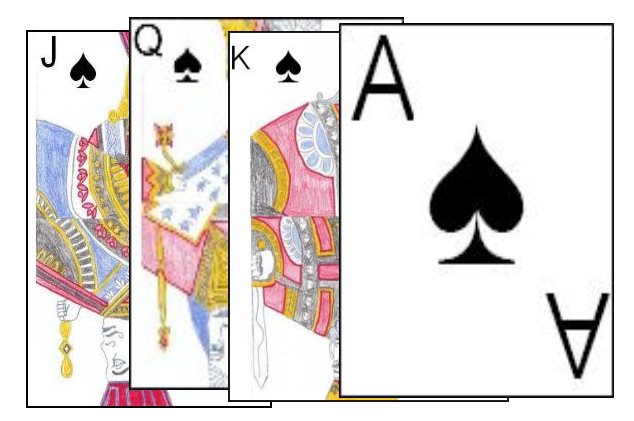 Honours and Overtricks: In addition to these bonus scores, a player can also accumulate additional points for Honours and overtricks. The honours are the four highest cards of the designated trump suit for that hand. Honours only apply and can be potentially scored on bids which include a trump suit. A player who manages to make his bid can also earn bonus chips from his opponents for honors he had in his hand. If the winning player had three Honours in hand, he scores 10 points. If the winner had all four Honours in hand he scores 20 points. If the high bidder had a partner for the round, these honours may be split evenly amongst the player and his partner. In addition, players can score additional bonus points for winning overtricks (additional tricks beyond the number bid by that player). For each additional trick a player wins over the number required for his bid, he earns five additional chips.
Honours and Overtricks: In addition to these bonus scores, a player can also accumulate additional points for Honours and overtricks. The honours are the four highest cards of the designated trump suit for that hand. Honours only apply and can be potentially scored on bids which include a trump suit. A player who manages to make his bid can also earn bonus chips from his opponents for honors he had in his hand. If the winning player had three Honours in hand, he scores 10 points. If the winner had all four Honours in hand he scores 20 points. If the high bidder had a partner for the round, these honours may be split evenly amongst the player and his partner. In addition, players can score additional bonus points for winning overtricks (additional tricks beyond the number bid by that player). For each additional trick a player wins over the number required for his bid, he earns five additional chips.
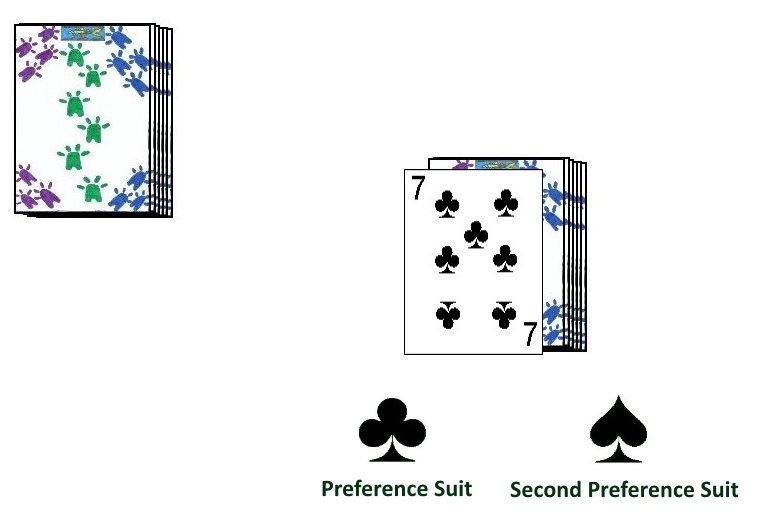 American Boston is designed to be played by four players with no partnerships. Determination of seats and first dealer can be done using the same method as used in standard Boston (drawing of high cards). Also similar to Standard Boston, after each hand the main deck used for play is never shuffled until the end of a game. It is shuffled before the start of the game but not thereafter until the completion of the game. The secondary deck, which is used for determination of suit ranking in the hand, however, should be shuffled after each hand.
American Boston is designed to be played by four players with no partnerships. Determination of seats and first dealer can be done using the same method as used in standard Boston (drawing of high cards). Also similar to Standard Boston, after each hand the main deck used for play is never shuffled until the end of a game. It is shuffled before the start of the game but not thereafter until the completion of the game. The secondary deck, which is used for determination of suit ranking in the hand, however, should be shuffled after each hand.
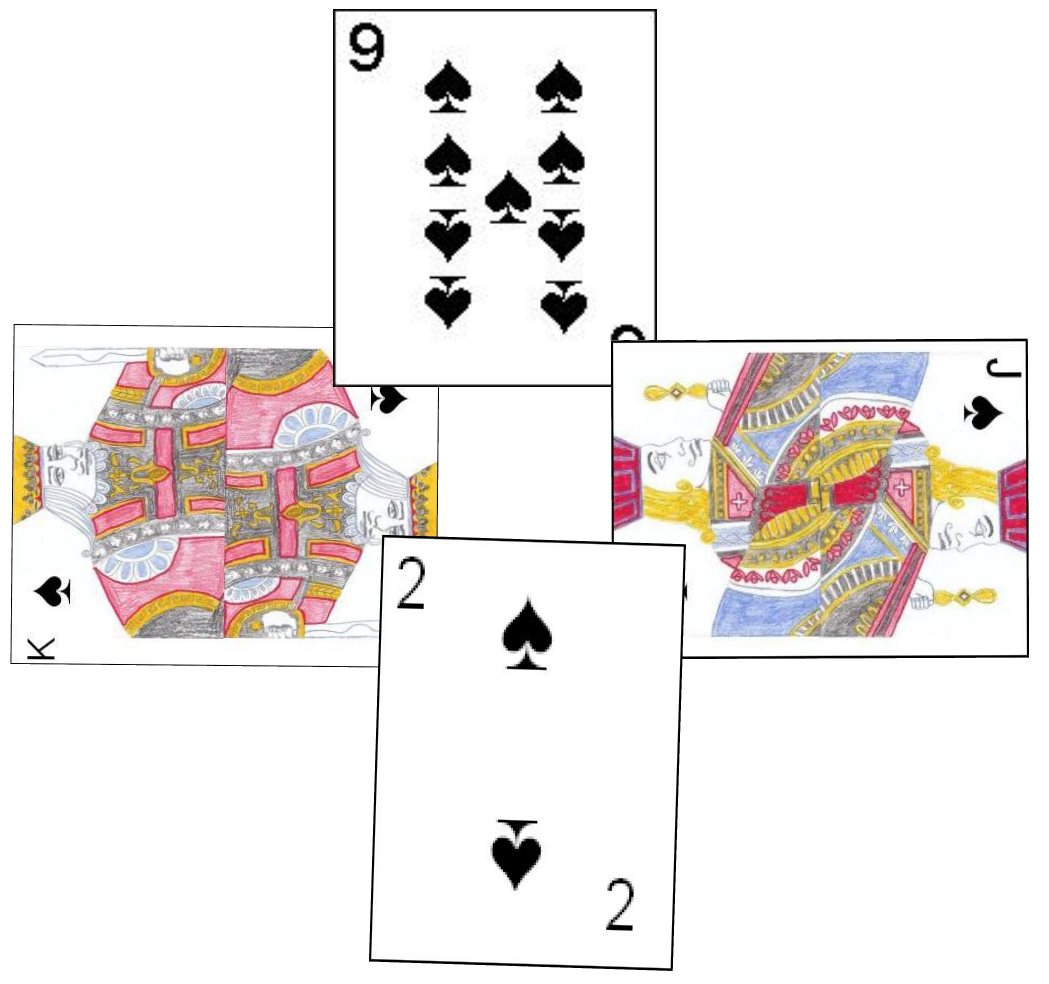 Once the high bidder is determined play of the hand begins, with the player to the dealer's immediate left leading the first card to the first trick. If the winning high bid included a call of one of the Preference suits, that is the suit that will be set as the trump suit for the hand. If the highest bid was a numbered bid but did not include a Preference suit as part of the bid, the high bidder may then select a suit of his choice to be the trump suit for the hand. The play of the hand is performed in exactly the same way as in standard Boston as described above, with each player playing one card to the trick in his proper turn. A player must follow suit if able, to the trick, and if
unable, may play any card from his hand, including a card of the trump suit if he has such a card and elects to play it. After all four players have played one card to the trick in turn, it is then determined which player won the trick. The highest card of the trump suit played to the trick wins that trick. If no cards of the trump suit have been played to the trick, the highest card of the suit originally led to the trick wins it. The completed trick should then be set aside, out of play for the remainder of the hand. These played cards are usually set in a face-down pile near the winner of the trick to help determine, at the end of the hand, how many tricks the player was able to win. The winner of each trick then leads the first card to begin the next trick. After all tricks have been played and won, the bidder then determines if he was able to make his bid by counting the total number of tricks he has won during the hand. If he did manage to win at least as many tricks as his high bid, he earns a number of chips from each other player based on his bid and the number of tricks he actually managed to win during the hand. The following chart details the number of chips he collects from each other player in the event he managed to fulfill his high bid:
Once the high bidder is determined play of the hand begins, with the player to the dealer's immediate left leading the first card to the first trick. If the winning high bid included a call of one of the Preference suits, that is the suit that will be set as the trump suit for the hand. If the highest bid was a numbered bid but did not include a Preference suit as part of the bid, the high bidder may then select a suit of his choice to be the trump suit for the hand. The play of the hand is performed in exactly the same way as in standard Boston as described above, with each player playing one card to the trick in his proper turn. A player must follow suit if able, to the trick, and if
unable, may play any card from his hand, including a card of the trump suit if he has such a card and elects to play it. After all four players have played one card to the trick in turn, it is then determined which player won the trick. The highest card of the trump suit played to the trick wins that trick. If no cards of the trump suit have been played to the trick, the highest card of the suit originally led to the trick wins it. The completed trick should then be set aside, out of play for the remainder of the hand. These played cards are usually set in a face-down pile near the winner of the trick to help determine, at the end of the hand, how many tricks the player was able to win. The winner of each trick then leads the first card to begin the next trick. After all tricks have been played and won, the bidder then determines if he was able to make his bid by counting the total number of tricks he has won during the hand. If he did manage to win at least as many tricks as his high bid, he earns a number of chips from each other player based on his bid and the number of tricks he actually managed to win during the hand. The following chart details the number of chips he collects from each other player in the event he managed to fulfill his high bid:
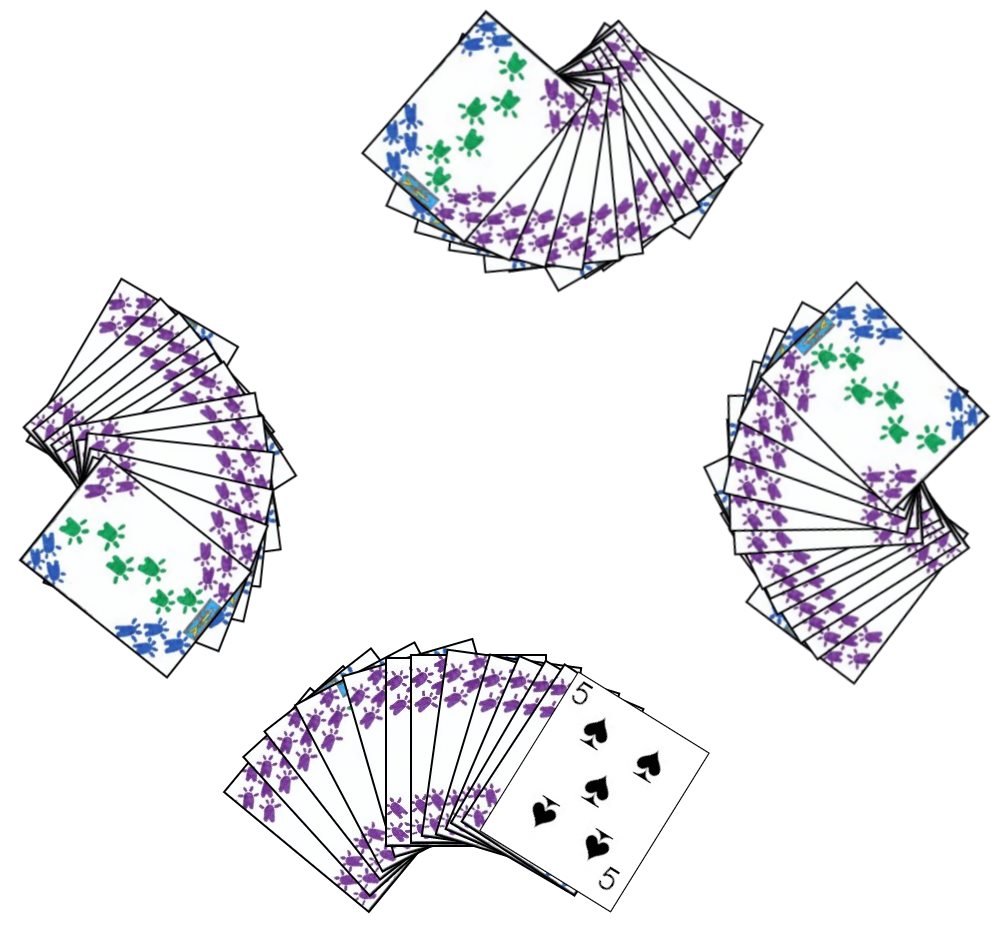 Determination of seating positions and first dealer are traditionally done in the following special manner in French Boston. To begin, any player picks up the shuffled deck and deals 13 cards to each player. Whichever player receives the Jack of Diamonds deals the first hand and has first choice of seats. The other players can then draw for high card (from the reshuffled deck) for the remaining seats at the table if there is any dispute on seating for the other players. Thereafter the deal rotates around the table in a clockwise direction from player to player after each hand.
Determination of seating positions and first dealer are traditionally done in the following special manner in French Boston. To begin, any player picks up the shuffled deck and deals 13 cards to each player. Whichever player receives the Jack of Diamonds deals the first hand and has first choice of seats. The other players can then draw for high card (from the reshuffled deck) for the remaining seats at the table if there is any dispute on seating for the other players. Thereafter the deal rotates around the table in a clockwise direction from player to player after each hand.
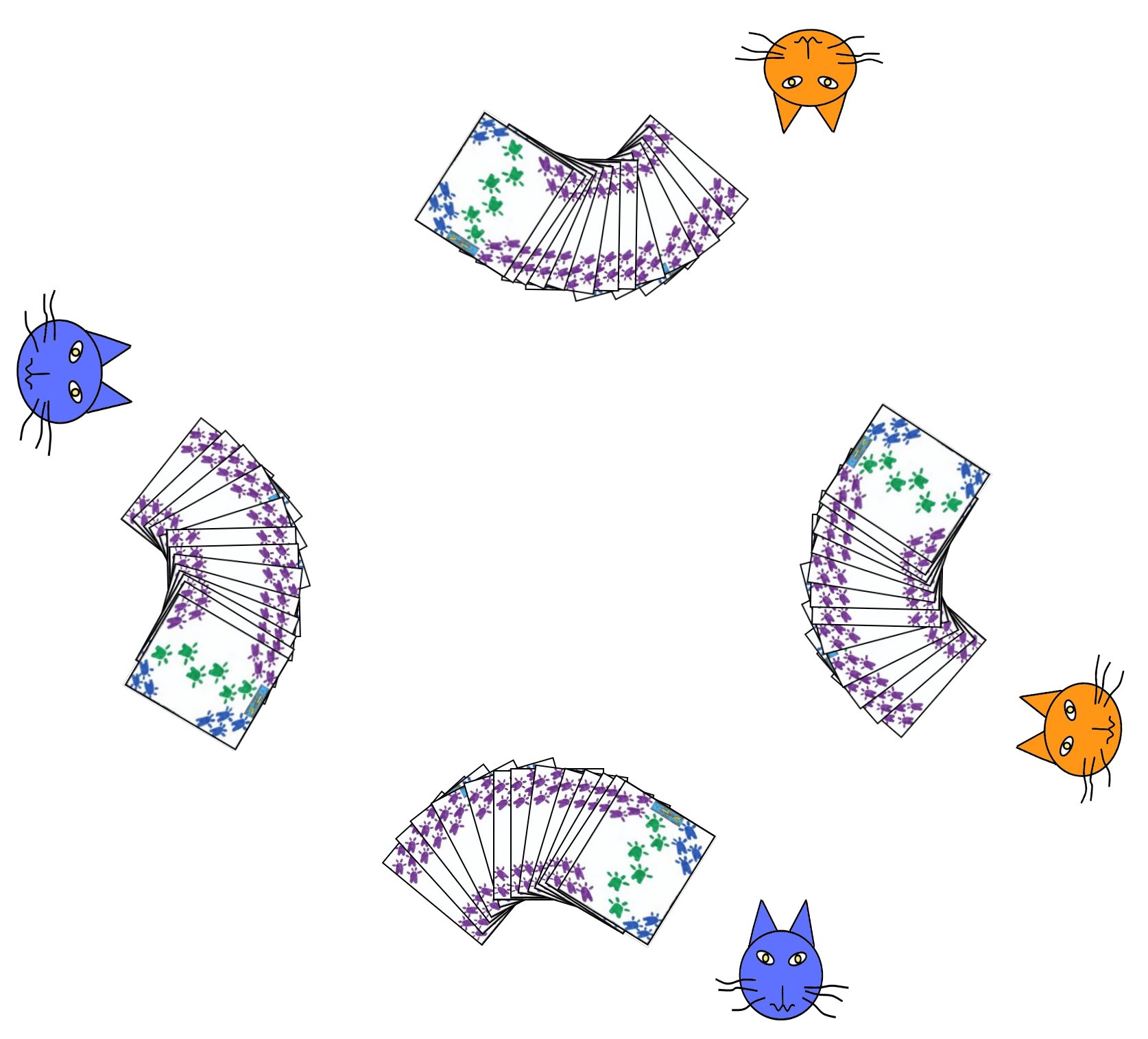 If making a bid of Simple in Petite or Simple in Belle, the bidder also must request a partner for the hand. He does this by stating "Je Demande" (equivalent to one of the Simple bids) but does not specify which of the opponents will be his temporary partner for the duration of the hand. When calling for a partner on a hand, the Petite suit or Belle suit must be the trump suit for the hand. After making this bid, the player places any card from his hand face-down on the table in front of himself. This card must be of the suit to be used for trump during the hand. On his turn, if a higher bid has not been made since the original request, another player may accept the request and becomes the player's temporary partner for the duration of the hand.
After his partner his determined for the hand (if accepted by any player) and if bid becomes the high bid for the hand, the player then exposes the card placed into the center of the table, with the suit of this card indicating the trump suit for the hand. After all players have seen the exposed card, the player places it back to his hand. No players change or move seats regardless of whom might accept the request to be the bidder's partner. Once a player, on a hand has made a bid or accepted a request to be another player's partner, he may not bid any of the Miserè bids on that same turn.
If making a bid of Simple in Petite or Simple in Belle, the bidder also must request a partner for the hand. He does this by stating "Je Demande" (equivalent to one of the Simple bids) but does not specify which of the opponents will be his temporary partner for the duration of the hand. When calling for a partner on a hand, the Petite suit or Belle suit must be the trump suit for the hand. After making this bid, the player places any card from his hand face-down on the table in front of himself. This card must be of the suit to be used for trump during the hand. On his turn, if a higher bid has not been made since the original request, another player may accept the request and becomes the player's temporary partner for the duration of the hand.
After his partner his determined for the hand (if accepted by any player) and if bid becomes the high bid for the hand, the player then exposes the card placed into the center of the table, with the suit of this card indicating the trump suit for the hand. After all players have seen the exposed card, the player places it back to his hand. No players change or move seats regardless of whom might accept the request to be the bidder's partner. Once a player, on a hand has made a bid or accepted a request to be another player's partner, he may not bid any of the Miserè bids on that same turn.
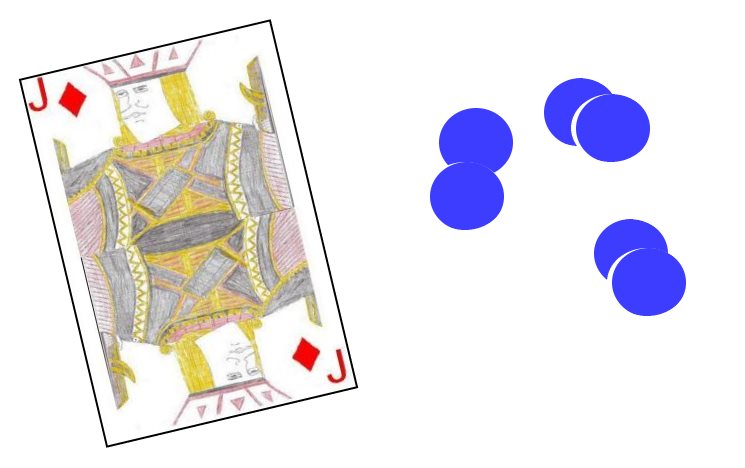 The player who has the Jack of Diamonds is entitled to collect two chips from every player in all bids except in the various Miserè bids, in which no chips are awarded for the card. In addition, if the bidder manages to successfully make his bid, he is entitled to take all the chips from the center pile. If he has a partner for the hand, each of the players take half of these chips.
The player who has the Jack of Diamonds is entitled to collect two chips from every player in all bids except in the various Miserè bids, in which no chips are awarded for the card. In addition, if the bidder manages to successfully make his bid, he is entitled to take all the chips from the center pile. If he has a partner for the hand, each of the players take half of these chips.